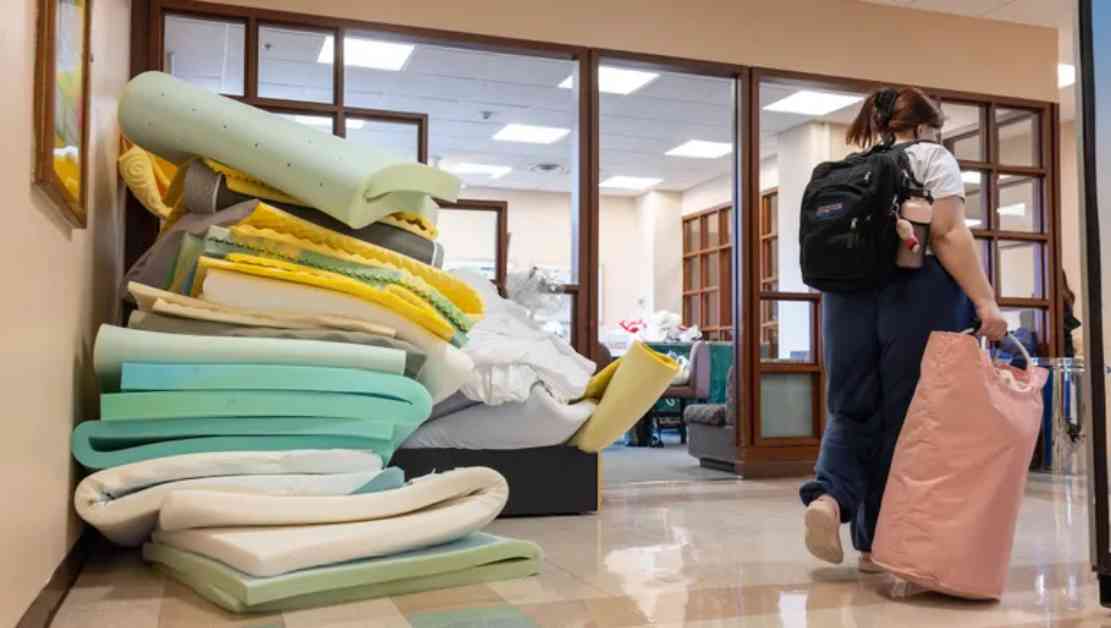Managing Move-Out Chaos at Boston University: A Comprehensive Guide to Sustainable Disposal Solutions
Boston University recently achieved a significant milestone by diverting an estimated 113 tons of material from disposal during its May move-out event. This impressive feat was made possible through various programs focused on recycling textiles, mattress toppers, and other materials, as well as donating certain textiles and edible food. Partners involved in the Goodwill, Not Landfill program included Morgan Memorial Goodwill Industries, Casella Waste Systems, Helpsy, and Olympia Moving & Storage.
This year’s event marked the largest diversion volumes to date for Boston University, with a 20-ton decrease in disposal volumes compared to the 2023 event. Over the entire fiscal year, which ended in June, BU managed to divert 52% of the 6,000 tons of waste it handled. These efforts align with BU’s goal to achieve 75% diversion by 2026 and zero waste by 2030, setting a precedent for sustainable waste management practices in higher education institutions.
The complexity of the May move-out period presents a prime opportunity for BU to address its disposal volumes, given the influx of more than 10,000 students moving out from dormitories spread across multiple campuses. Sarah Healey, BU’s zero waste manager, emphasized the challenges of managing high volumes of material during this period, describing it as a “disposal nightmare.”
To enhance the efficiency of the move-out process, BU took a proactive approach by hiring 15 students to assist in organizing donation areas, packaging certain textiles, and facilitating the movement of materials. Olympia Moving & Storage played a crucial role in transporting donations to a separate staging area, contributing to the overall success of the event. Despite incurring an additional cost of $5,000 for these enhancements, Healey deemed it a worthwhile investment considering the substantial increase in diversion achieved.
One of the key outcomes of the move-out program was the collection of multiple trailers filled with Goodwill donations, which are poised to benefit future students through a nearby Goodwill store. In compliance with Massachusetts’ disposal ban on textiles, BU collaborated with Helpsy to recycle bedding and other materials that Goodwill could not accommodate. The prevalence of fast fashion has posed a challenge for textile management, underscoring the importance of sustainable disposal practices in the face of evolving consumer trends.
In addition to textiles, the move-out program generated a significant volume of mattress toppers, which were processed at a Casella facility in Connecticut. Healey highlighted the logistical challenges faced during the move-out period, emphasizing the need for strategic interventions to streamline operations and maximize diversion efforts.
Boston University’s commitment to rethinking waste systems is evident in its efforts to reduce total waste volumes managed since 2006 while increasing diversion rates. Despite these achievements, BU acknowledges the ongoing work required to achieve its zero waste goals. A pivotal step in this journey was the establishment of a new contract with Casella in 2021, aligning the hauler’s incentives with the school’s sustainability objectives.
The collaborative partnership between BU and Casella exemplifies the strength of collective expertise in sustainable material management practices. Jeff Weld, Vice President of Communications at Casella, commended BU’s commitment to sustainability and highlighted the positive outcomes achieved through their collaboration. Healey’s strategic approach to waste management, informed by her experience at Casella, has been instrumental in driving BU’s sustainability initiatives forward.
Continued efforts to standardize waste receptacles and improve data reporting systems demonstrate BU’s dedication to laying a solid foundation for achieving its zero waste goals. Education plays a vital role in promoting sustainable practices among students, with a focus on upstream interventions to reduce waste generation before move-in and move-out periods. By engaging city officials and higher education counterparts in discussions on waste management strategies, BU aims to streamline messaging and foster a culture of sustainability within the campus community.
Looking ahead, BU’s focus on waste reduction and diversion will be put to the test as students begin moving in for the fall semester. The school plans to implement cardboard corrals throughout campus and collaborate with Casella on more frequent pickups to manage the influx of waste generated during this period. By integrating sustainable disposal solutions into its operations, Boston University continues to lead by example in promoting environmental stewardship and fostering a culture of sustainability within its campus community.

